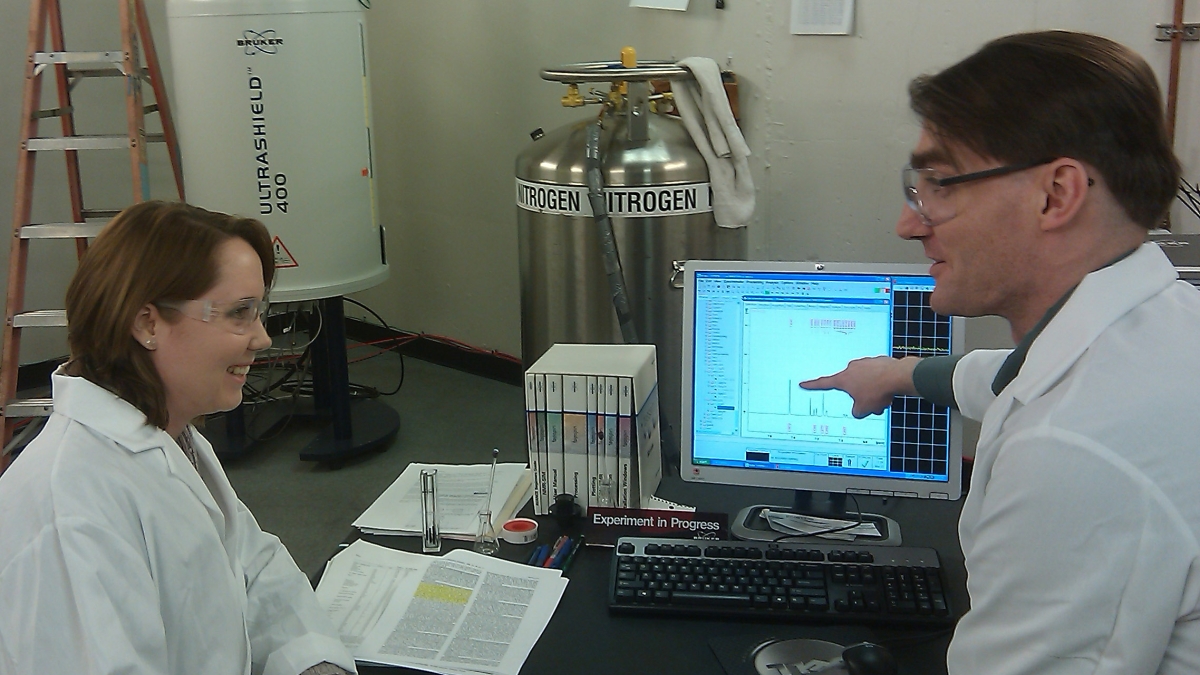Grant strengthens science partnership with community college

Thanks to a $250,000 National Science Foundation grant, students studying organic chemistry and biotechnology at Glendale Community College (GCC) will have greater access to sophisticated instrumentation for chemistry and life science research while also having a clearer path toward completion of a bachelor’s degree through ASU’s New College of Interdisciplinary Arts and Sciences.
Jason Serin, GCC chemistry department chairman, partnered with New College’s Todd Sandrin and Carl Wagner to secure funding from NSF’s Transforming Undergraduate Education in STEM program. (STEM stands for science, technology, engineering and mathematics.) A portion of the funds enables GCC to purchase a nuclear magnetic resonance (NMR) instrument that helps determine the structures of organic molecules and assess mixtures of molecules.
Sandrin and Wagner are faculty members in New College’s Division of Mathematical and Natural Sciences on ASU’s West campus. Sandrin is an associate professor and the division’s associate director; Wagner is an assistant professor.
The NMR will serve as focal point for a project designed to encourage more students, particularly underrepresented students, to pursue STEM degrees and careers. The grant funds a three-year effort to implement science curriculum changes and evaluate their effectiveness.
“Previous studies have shown science and technology students are more motivated and willing to expend effort on learning that is hands-on, lab- and research-based,” Serin said. “This grant enables us to make changes to our chemistry and biotechnology laboratory curriculum that will increase students’ proficiency in using sophisticated lab equipment as well as their understanding of theory behind that equipment and how using it advances scientific inquiry.”
In addition to using the new NMR at GCC, students at the college will have opportunities to use a research-grade NMR at ASU’s West campus, along with a state-of-the-art mass spectrometer instrument also located at the West campus.
“This is an outstanding win-win situation,” Sandrin said. “We look forward to the opportunity to familiarize GCC students with the university environment and make them aware of the doors of opportunity that will open for them as they pursue a bachelor’s degree through New College. This collaboration will benefit students on the West campus, as they work with and learn from their fellow students from GCC. The grant also will support curricular change and innovation that will benefit students at GCC, the West campus, and potentially nationwide.”
GCC lab classes in chemistry and biotechnology will be revised to incorporate the NMR in inquiry-based instruction. This will involve supplying the experimental design and requiring students to interpret and explain the results, as well as providing a problem and assisting students as they design an experimental protocol to solve it.
In one experiment created by Wagner and fellow MNS faculty member Thomas Cahill, organic chemistry students at GCC and the West campus will use NMR to analyze the mixture of chemicals responsible for the “hot” sensation in hot peppers.
Serin, Sandrin and Wagner are particularly interested in evaluating how curricular changes incorporating the NMR affect both students’ understanding of instrumentation and student attitudes toward pursuing STEM degrees and careers. A key goal of the project is to increase the number of students from underrepresented populations entering STEM fields.
“Because the Maricopa Community College District is one of the largest community colleges in the world, we have an opportunity to make a major impact on minority student enrollment in STEM fields,” Serin said. “We hope to see this effort be incorporated at other colleges in the district, including Phoenix College, Scottsdale Community College and Paradise Valley Community College.”
Sandrin, meanwhile, says New College is also intent on expanding its partnerships with the Maricopa Community Colleges.
“This grant project has catalyzed the development of partnerships with additional community colleges including Estrella Mountain Community College,” Sandrin said.
“A number of our MNS students transferred from GCC and are talented, hard-working students who participate with faculty in research projects,” he added. “We look forward to strengthening this pipeline of students from local community colleges who will have exciting opportunities to enter the workforce in STEM fields or pursue graduate degrees after completing their studies in New College.”
One of the redesigned GCC lab courses will bring students to the West campus for lab experiments. Once their experiments are concluded, students will present the results in a symposium format. The symposium, coordinated by Sandrin and his MNS colleagues, also will focus on strategies for successfully transitioning to the four-year university environment and introduce students to graduate school opportunities and careers in research. Plans call for private sector representatives to participate as well.
The NSF grant strengthens the existing partnership between New College and GCC in science curriculum. The two organizations recently established a degree program enabling students who have completed GCC’s Associate of Applied Science (AAS) degree in Biotechnology and Molecular Biosciences to transition seamlessly into the New College Bachelor of Applied Science (BAS) program with a concentration in Cell and Molecular Biology Research (CaMBR).
“These collaborative endeavors will support our growing genomics and biotechnology industry in Arizona, helping the state’s economy to thrive in the coming years,” Serin said.